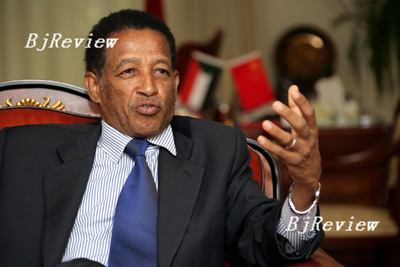
Darfur, an underdeveloped region in west Sudan wracked by armed conflict, has been thrust into the global spotlight in recent years. The area has been in chaos since February 2003, when some armed groups started to attack the government installations in the region. It is estimated that more than 10,000 have died and approximately 1 million have been left homeless in the fighting.
But what really happened there? How can the international community help? Beijing Review reporter Yan Wei talked with Mirghani Mohamed Salih, Sudan's Ambassador to China, to get an insider's look at these widely scrutinized questions.
Beijing Review: How do you characterize the Darfur issue?
Mirghani Mohamed Salih: The issue of Darfur matters a lot at this time to the media inside and outside China. However, this was not the case when Sudan had been experiencing a very long conflict in south Sudan, which referred back to the times of the British colonization more than 50 years ago and was brought to an end in January 2005 when the Sudanese Government signed with the Sudan People's Liberation Movement (SPLM) what is known as the Comprehensive Peace Agreement. Regarding the issue of Darfur, simply I can say it is a media-made problem because the Western media and the NGOs have played a very negative role to make this problem complicated as they create from a traditional conflict between local citizens a big issue. The Western media hasn't told the truth about the situation in Darfur. They presented the conflict in south Sudan as if it was between Muslims and non-Muslims. Because all the inhabitants in Darfur are Muslims, the Western media started to describe the situation as conflict between Arabs and Africans, which is not true. The international media and the NGOs, which are supposed to help the people and alleviate the consequences of this conflict, have added fuel to this war by giving incorrect information to the international community. Some Western countries tend to use the issue of Darfur to put pressure on the Sudanese Government. In a very short period, this issue was brought before the UN Security Council and since then has taken on great magnitude.
The root cause of the problem in Darfur is the lack of development as in other parts of Sudan. In addition, there has been the ecological problem of drought and desertification, which has stricken north and west Sudan like other parts of Sub-Saharan Africa since the late 1970s. Most of the people in that area are nomads who move frequently. In the rainy season they go to the north and when it's dry, they go south. During these movements, some clashes fall between tribes over resources. They usually reconciled by the tribal leaderships, but they have never been of political nature. So, the whole problem of Darfur is a problem of development. It has nothing to do with what the Western media and NGOs are saying.
After the Sudanese Government signed the Abuja Peace Agreement with the main rebel group in May 2006, the situation is continually improving. And now I can say there is no fighting in Darfur at this moment. What is there are some groups of militants who are creating havoc for innocent civilians and even to the NGOs working in the area. However, after the implementation of the peace agreement has put in process, many of those who are living in the camps that managed by the local government started to go back to their homes and villages.
Liu Guijin, China's Special Representative for Darfur, believes that the issue is more about development and that the conflict arose from poverty and resource scarcity. UN Secretary General Ban Ki-moon, however, says that an "ecological crisis" is the cause of the conflicts over food and water in Darfur. Do you agree with them?
What the special representative has said is correct, because if you have development, you can control the ecological problems. What we need now in Darfur is to provide enough water resources, power supply, schools and hospitals. We do appreciate the efforts of our friends in China who are doing their best to develop the infrastructure in Darfur. A case in point is that some Chinese companies are building water projects in Nyala in
| 